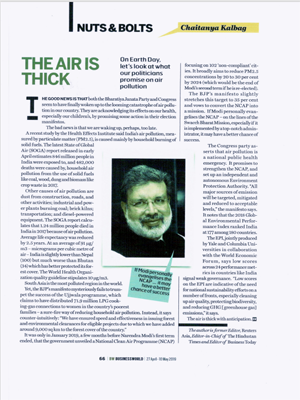THE AIR IS THICK
[Business World]
Published date: 27 Apr 2019
The Good news is that both the Bharatiya Janata Partyand Congress seem to have finally woken upto the looming catastrophe of air pollution in our country. They are acknowledging its effects on our health, especially our children’s, by promising some action in their election manifestos.
The bad news is that we are waking up, perhaps, too late.
A recent study by the Health Effects Institute said India’s air pollution, measured by particulate matter (PM2.5), is caused mainly by household burning of solid fuels. The latest State of Global Air (SOGA) report released in early April estimates 846 million people in India were exposed to, and 482,000 deaths were caused by, household air pollution from the use of solid fuels like coal, wood, dung and biomass like crop waste in 2017.
Other causes of air pollution are dust from construction, roads, and other activities; industrial and power plants burning coal; brick kilns; transportation; and diesel-powered equipment. The SOGA report calculates that 1.24 million people died in Indiain2017becauseofairpollution. Average life expectancy was reduced by 2.5 years. At an average of 91µg/ m3 – micrograms per cubic metre of air – India is slightly lower than Nepal (100) but much worse than Bhutan (34) which has better protected its forest cover. The World Health Organization quality guideline stipulates 10 µg/m3 South Asia is the most polluted region in the world.
Yet, the BJP’s manifesto mysteriously fails to trumpet the success of the Ujjwala programme, which claims to have distributed 71.9 million LPG cooking-gas connections to women in the country’s poorest families – a sure-fire way of reducing household air pollution. Instead, it says counter-intuitively: “We have ensured speed and effectiveness in issuing forest and environmental clearances for eligible projects due to which we have added around 9,000 sq km to the forest cover of the country.”
It was only in January 2019, a few months before Narendra Modi’s first term ended, that the government unveiled a National Clean Air Programme (NCAP) focusing on102 ‘non-compliant’ cities. It broadly aims to reduce PM2.5 concentrations by 20 to 30 per cent by 2024 (which would be the end of Modi’s second term if he is re-elected).
The BJP’s manifesto slightly stretches this target to 35 per cent and vows to convert the NCAP into a mission. If Modi personally evangelises the NCAP – on the lines of the Swacch Bharat Mission, especially if it is implemented by a top-notch administrator, it may have a better chance of success.
The Congress party asserts that air pollution is a national public health emergency. It promises to strengthen the NCAP, and set up an independent and autonomous Environment Protection Authority. “All major sources of emission will be targeted, mitigated and reduced to acceptable levels,” the manifesto says. It notes that the 2018 Global Environmental Performance Index ranked India at177among180 countries. The EPI, jointly produced by Yale and Columbia Universities in collaboration with the World Economic Forum, says low scores across 24performance metrics in countries like India signal weak. governance. “Low scores on the EPI are indicative of the need for national sustainability efforts on a number of fronts, especially cleaning up air quality, protecting biodiversity, and reducing GHG [greenhouse gas] emissions, “it says.






